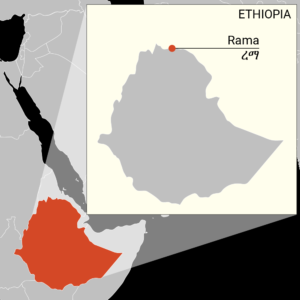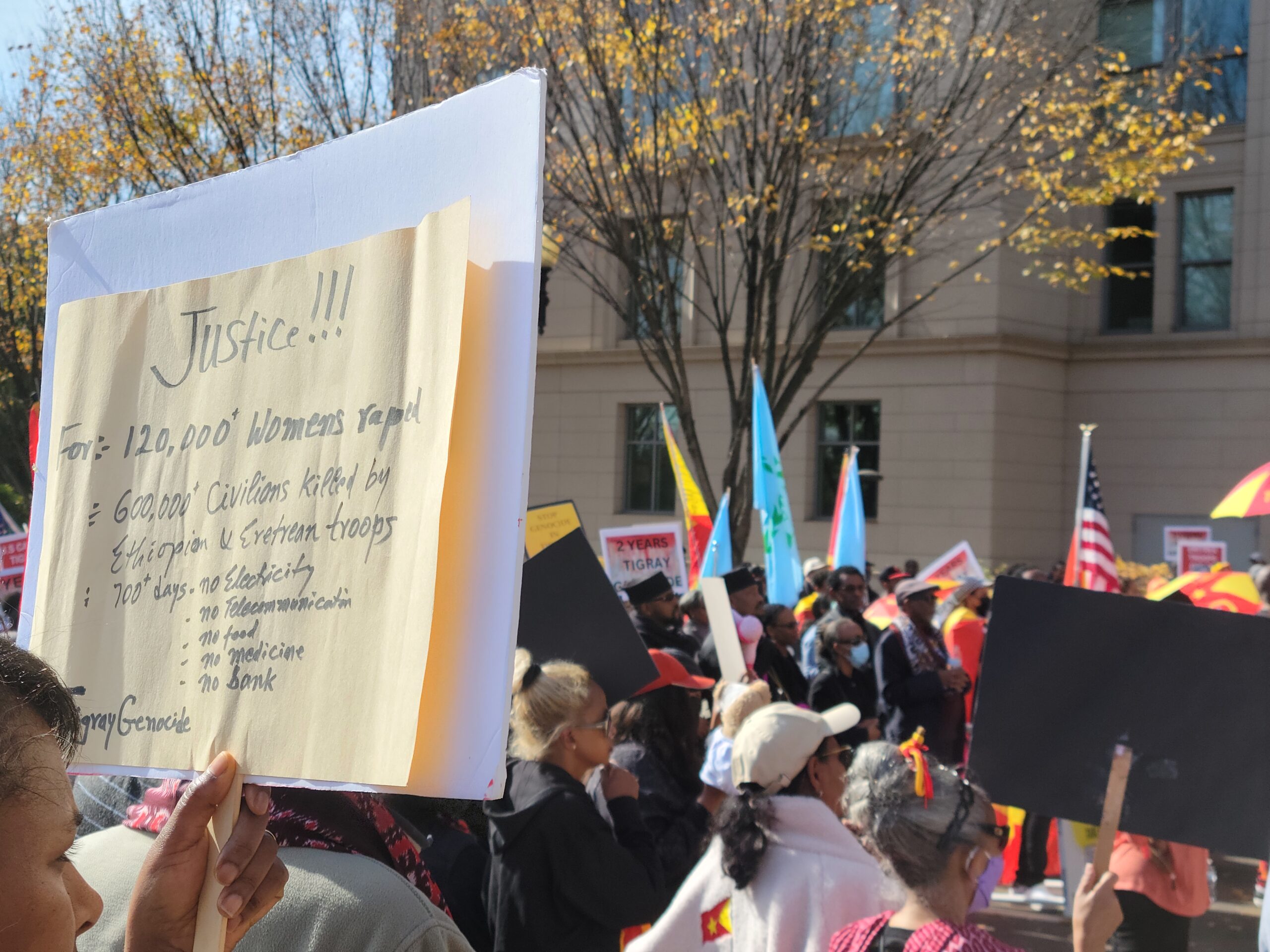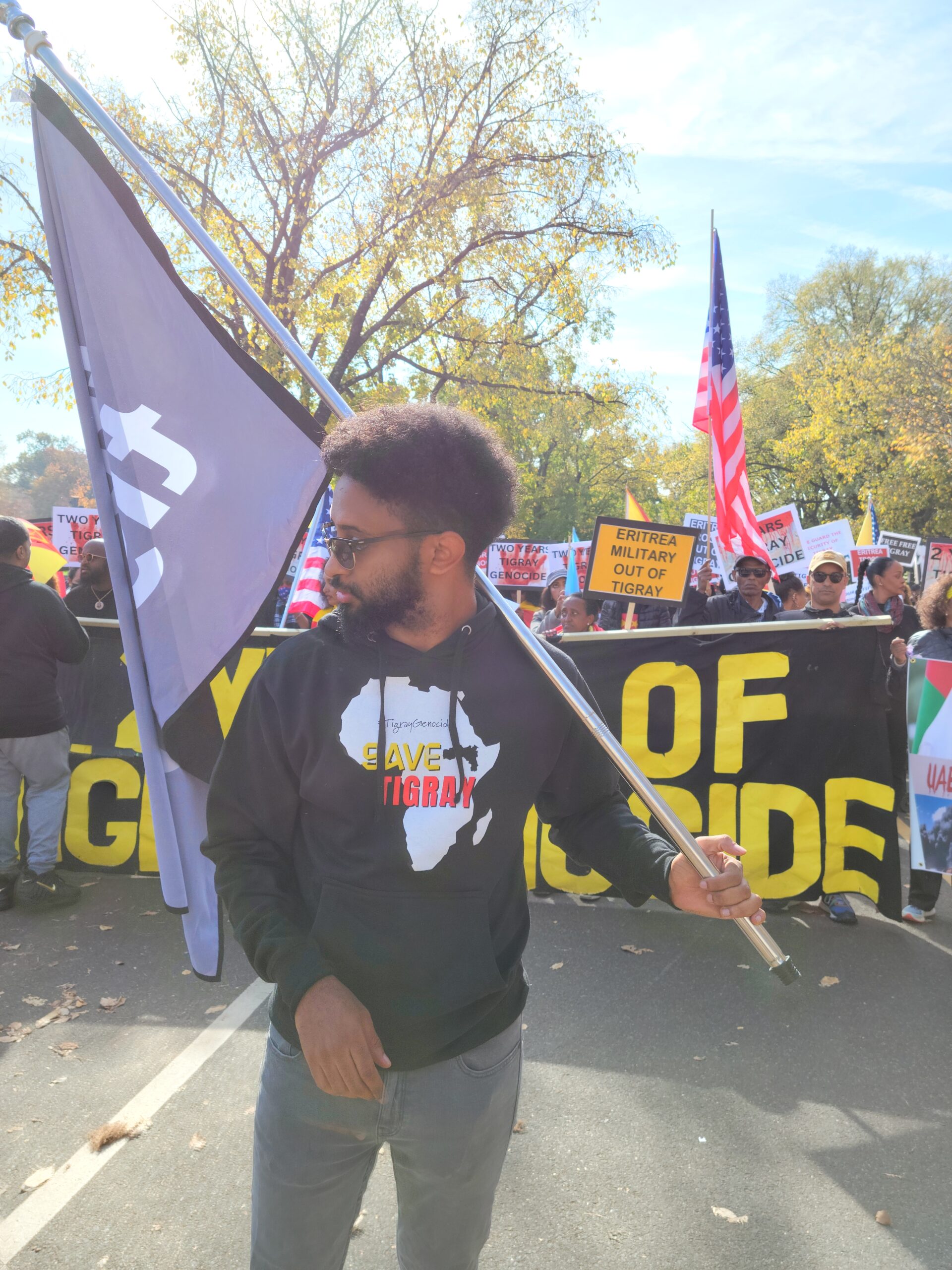Violence and hate speech leave communal and interpersonal rifts difficult to mend.

Gigi Teferi smiles as she brings a plate of geta weta tibs to a diner’s table. A ramekin of steaming, stir-fried beef tips and vegetables is piled on a bed of injera, a flatbread. “Enjoy,” she says as she leaves to serve other customers at Effoi Restaurant in Silver Spring, Maryland.
Behind Teferi’s friendly demeanor, however, and those of the other wait staff and patrons, is an unyielding preoccupation with the safety of friends and family suffering through one of most deadly, underreported conflicts of the 21st century, in the northern Tigray region of their native Ethiopia.
That same preoccupation has also split the influential Ethiopian diaspora in the United States: On one side are Ethiopian Tigrayans; on the other are supporters of Prime Minister Abiy Ahmed.
“Everyone you see here is Tigrayan,” Teferi says of Effoi’s diners.
“I grew up in Ethiopian culture. I had a lot of Amhara, Oromo friends,” says Simon Hagos, a community leader in the Washington area who is Tigrayan and migrated to the United States five years ago. Since the war began, he says, “I started noticing the animosity and the hate against me…. I was uncomfortable at some point: Were they going to poison me?… So I stopped going to Ethiopian restaurants.”
From the war’s onset in November 2020, residents of the region of Tigray have been subjected to ethnic cleansing and drone warfare. Researchers at the University of Ghent, who conducted interviews with survivors and analyzed United Nations data, say that at least 400,000 have died in Tigray from killings, famine and a lack of access to medical care. Other experts put the figure closer to 500,000.
The government in Addis Ababa, beyond hampering the delivery of humanitarian aid to the region, imposed a total communications blackout, making it nearly impossible for a sizeable portion of the U.S. diaspora–more than 250,000, according to the Migration Policy Institute – to keep tabs on family and friends.
“My family is still there,” Teferi, who grew up in Rama, a town near the Ethiopian-Eritrean border, says in an interview with Capital News Service. Between lunch and dinner service, she says she doesn’t know whether or not her parents, sister, nephews or nieces are alive or dead.
Even her brother, who had served in the army, was imprisoned recently without cause, she says; now, she adds, having had his government ID revoked, he cannot even rent an apartment.
Hagos, who dines regularly at Effoi, worries about his father. “My dad was in jail. [The government] released him when he got COVID,” he says. Now he needs a liver transplant to save his life.
Hagos is working to get him into the United States and has gone so far as to enlist the aid of surgeons at Johns Hopkins Hospital to lobby the Ethiopian government on his father’s behalf.
Meaza Gebremedhin, a Tigrayan who moved to Northern Virginia for graduate school in 2019, also has had no direct contact with her family back home. Her only connections have been through spotty correspondences via the Signal messaging app with a few Tigrayans with internet access. She says she learned from acquaintances that her father was killed this year.
The divisions within the Washington-area diaspora have segregated popular stores and other venues.
When Tsega Gsilassie took his 4-year-old daughter to get a haircut at an Ethiopian salon in Silver Spring, he says he overheard the stylist joking with her coworker about his daughter. “She said, ‘I am allergic to this Tigrayan hairstyle,’” he said.
Teferi pointed out the homogeneity of Effoi’s patrons. “Everyone you see here is Tigrayan,” she said during an October lunch service.
Obey Keshi Kiflemariam, a Tigrayan Ethiopian Orthodox priest who leads a congregation in Harrisonburg, Virginia, said non-Tigrayans left his church when the war began. By November 2020, “all non-Tigrayans left,” he said.
Teferi said that she has noticed a similar divide in the churches in Washington. She said that the Kidist Mariam Ethiopian Orthodox Church is now mostly attended by Amhara “who would tell you their side of the story,” while the Medhane Alem Orthodox Church four miles away is full of Tigrayans. The first Google review for the latter says that it is “good church for tigrians.”
The division within the Ethiopian Orthodox Church, the majority religion among Ethiopians, is not confined to the mid-Atlantic community. Danny Hadera, a public relations specialist with Safety and Justice for Tigray, says that well before the war started, his parents’ church in Dallas “kicked out the Tigrayan pastor,” and that they had to scramble to fundraise for the priest to open a new church for Tigrayans.
A HOMELAND IN TURMOIL
The Ethiopian civil war began when Tigrayan forces attacked a northern base of the government’s Ethiopian National Defense forces in what the leadership of the Tigrayan People’s Liberation Front (TPLF), Tigray’s most popular political party, deemed a pre-emptive strike.
Tigrayans make up only 5.7% of Ethiopia’s 118 million inhabitants and comprise one of 80 ethnic groups in the country. Despite their minority status, Tigrayans led a ruling coalition of ethnic parties from 1991 to 2018
The country’s tumultuous history includes several authoritarian regimes in the past 50 years, with Tigrayan, Amhara and other Ethiopian ethnicities taking turns ruling the country.
Abiy was appointed prime minister in 2018, following five years of protest against the TPLF-led coalition. Many Ethiopians and international experts believed he would bring stability and democratic reform. In fact, Abiy’s early peace deal with neighboring Eritrea earned him the 2019 Nobel Peace Prize.
But less than a year later, the Abiy government invaded Tigray with the help of Eritrean forces. At the same time he imposed a near-total blockade of humanitarian aid and cut off communications, electricity and banking services.
Teferi, the waitress, has spoken with her sister only once in the last two years, after her sister paid an Eritrean soldier to use his satellite phone. “She couldn’t say much about what was happening,” she says.
On October 15, U.N. Secretary-General António Guterres issued a statement on the “dire humanitarian situation” in Ethiopia. A same-day press release said the U.N. “believes tens of thousands have been killed” in Tigray, as well as the neighboring regions of Amhara and Afar.
Three days later, Volker Türk, the U.N. high commissioner for human rights, told a news conference that deliberate attacks on civilians “amount to war crimes.” The civilian toll in the war, he said, has been “utterly staggering.”

TARGETED FOR THEIR ADVOCACY
Hagos, who said he works in finance, says that until the war he had always thought of himself as Ethiopian rather than Tigrayan. Then, former friends started harassing him as he stood up for his people, he said. They would say, ‘You’re this people, you’re monsters, you’re killers.’”
Over time, the harassment escalated, he said. He said he sold his house in Germantown to escape what he saw as dangerous stalking: “Twitter, Instagram texts saying we know where you live, we know where your parents are, we’re going to get you. I had a time where I received a picture of my house… people posted my bank account information, my credit scores,” he says.
He says he was attacked on two occasions while walking to his car from Tigrayan gatherings at Skyline Plaza in Falls Church, Virginia, a popular party venue. He recognized his assailants as non-Tigrayan Ethiopians acquaintances, he said. He did not report the incidents to police, he said, because “everyone rushed me to my house.” This account could not be independently verified by Capital News Service.

Gebremedhin, another prominent Tigrayan voice, said she has had similar experiences. “I have been cyberbullied… received death threats,” she says, “and a gun has been pulled on me in one of the protests that we were leading.”
Twitter repliers called Gebremedhin a “witch” and a “whore” while making threatening references to her family, according to copies of her Twitter account.
Spokespeople for the Prince George’s, Montgomery and Fairfax County police departments said their departments have not noticed any uptick in crime among the Ethiopian community.
THE WAR ONLINE
Confrontations are rife on the internet as well.
Online hate speech, including social media accounts originating in the United States, has exacerbated the tensions that led to war, according to a 2021 United States Institute of Peace study. Platforms in Ethiopia “are fraught with disinformation and misinformation, used to disseminate hate speech, and even incite violence,” author Lidet Shiferaw wrote.
The human rights group Amnesty International notes “a significant rise in other recent social media posts inciting violence and using ethnic slurs against Tigrayans” that were shared by influential journalists and political figures.
Even Abiy used dehumanizing ethnic slurs. In speeches he made in summer of 2018, Abiy warned people to watch out for “day-time hyenas” and “outsiders.”
On Nov. 3, 2021, Facebook removed a post by Abiy for violating the platform’s policies against inciting violence. In the post, Abiy called for Ethiopians to “bury the terrorist TPLF” during a Tigrayan offensive that almost reached Addis Ababa.
Some of Abiy’s closest advisers are even more inflammatory. Daniel Kibret, a deacon and social affairs advisor to Abiy, compared Tigrayan soldiers and political leaders to “Satan” and declared that they “should be known as the last of their kind.”
Tigrayan leaders and Abiy signed a peace deal in November that may end the fighting and the aid blockade.
The deal wouldn’t heal the Washington region’s diaspora, Gebremedhin says. “There needs to be an acknowledgement of guilt. Some of them have been mobilizing resources and funding the genocidal war… blocking essential aid… involved in hate speech. I want to be optimistic but the reality just indicates otherwise.”

You must be logged in to post a comment.